Then vs. Now: Why Parenting Styles Have Changed Over Time
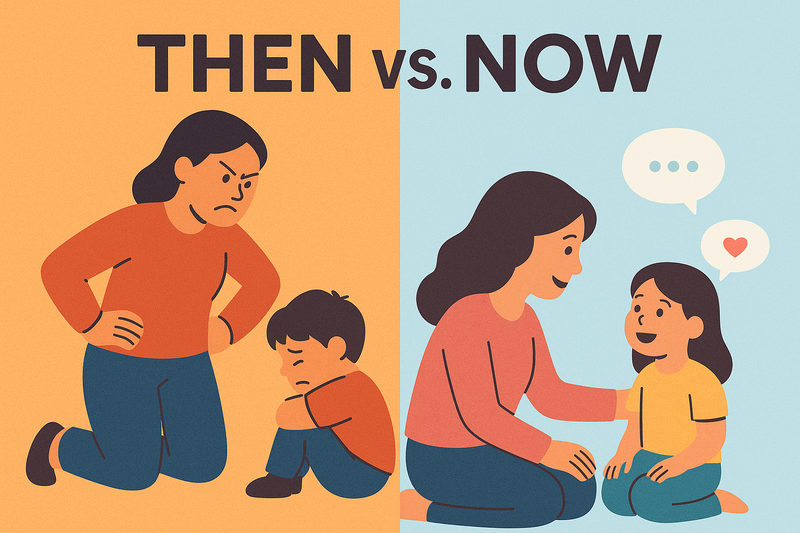
Discover how parenting has evolved from strict discipline to empathetic approaches. Explore the shift from timeouts to emotional intelligence.
From "Because I Said So" to "Let's Talk About It": A Deep Dive into the Seismic Shifts of Modern Parenting
A 1970s parent, faced with a child's defiance, might have ended the conversation with a simple, unassailable declaration: "Because I said so." Fast forward fifty years, and a parent in the 2020s might find themselves in a prolonged negotiation over bedtime, simultaneously cross-referencing a parenting blog on their phone while trying to validate their child's feelings about not wanting the day to end. While the fundamental goal—to raise happy, healthy, and capable children—remains a constant across generations, the cultural scripts, psychological tools, and external pressures shaping the parenting journey have undergone a seismic transformation. The role has evolved from one of straightforward enforcement to one of complex curation. Today's parents are tasked with curating experiences, managing information flows, and engineering optimal emotional environments, all while navigating an overwhelming landscape of choice and a profound sense of personal responsibility for the outcome, often leading them to question outdated parenting trends.
This report will explore the key transformations that define the "Then vs. Now" of parenting. It will dissect the evolution of discipline from fear-based obedience to connection-based guidance, examine the restructuring of family roles and daily routines, analyze the changing nature of childhood itself, and finally, delve into the all-encompassing influence of the digital age on the parental psyche.
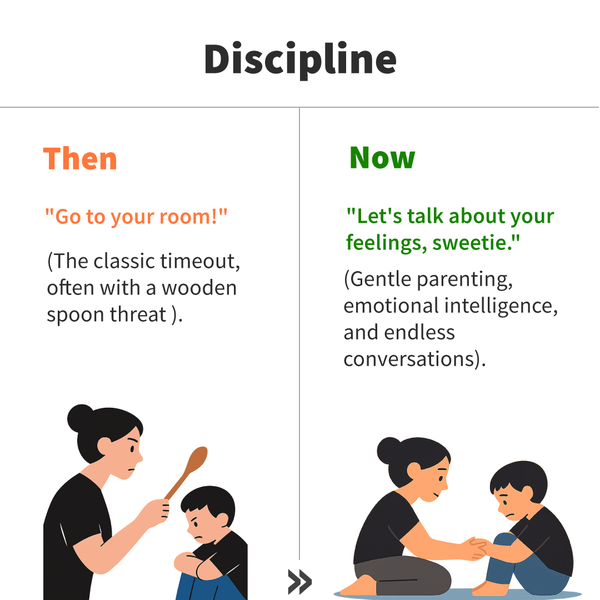
The Great Discipline Debate: From Fear-Based Obedience to Connection-Based Guidance
The most foundational shift in parenting philosophy lies in the approach to discipline. The historical model, built on a foundation of authority and compliance, has largely given way to a modern paradigm that prioritizes emotional attunement and evidence-based guidance. This evolution reflects a deeper change in how society views children, authority, and the very goals of raising a child.
Parenting "Then": The Age of Authority and Obedience
For much of human history, discipline was unambiguous and often physical. The use of corporal punishment was not merely a private family matter but a societal norm, embedded in judicial systems, schools, and homes for centuries. The adage "spare the rod, spoil the child," with roots in biblical proverbs, served as a core tenet of child-rearing. This approach was particularly pronounced in early American history, where Puritan parents viewed strict, physical discipline as a necessary tool for saving a child's soul from innate sinfulness. Disobedience was a grave moral failing, sometimes corrected with public whippings, and children were taught that their will must be "broken" to conform to the authority of parents and God.
This historical practice is best understood through the lens of the authoritarian parenting style. This model is characterized by high levels of parental control and low levels of warmth or responsiveness. Communication was strictly one-way, encapsulated by the phrase "Because I said so," with rules enforced without explanation and obedience expected without question. The primary objective was compliance, often achieved through the child's fear of punishment.
Dissenting views were slow to emerge. In the 17th century, philosopher John Locke proposed the concept of tabula rasa, or the "blank slate," suggesting children were not inherently sinful and would thrive with guidance rather than harsh discipline. It wasn't until the mid-20th century that these ideas gained popular traction, most notably with Dr. Benjamin Spock's influential book
Baby and Child Care. Dr. Spock advocated against most forms of corporal punishment, encouraging parents to be more reasonable, consistent, and friendly—a revolutionary stance at the time that was often criticized by traditionalists as dangerously "permissive".
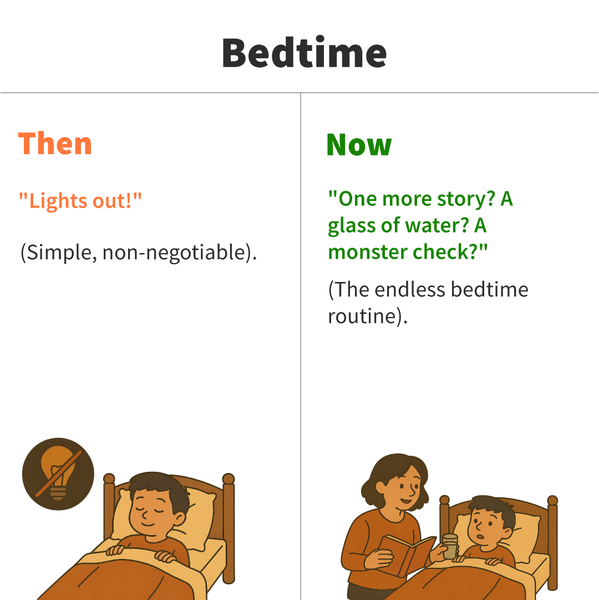
Parenting "Now": The Rise of the Evidence-Based, Emotionally-Attuned Parent
The contemporary parenting landscape is dominated by psychological research, most notably the work of Diana Baumrind in the 1960s. Her research identified three primary parenting styles—authoritarian, authoritative, and permissive—to which psychologists later added a fourth, neglectful/uninvolved. This framework provides the scientific vocabulary for understanding the shift away from historical norms.
Decades of subsequent research have consistently identified the authoritative parenting style as the "gold standard," associated with the most positive outcomes for children. This style masterfully balances high warmth with firm control. Authoritative parents establish clear rules and boundaries but also explain the reasoning behind them, fostering a collaborative environment of two-way communication. Their disciplinary methods are supportive rather than punitive, focusing on teaching responsibility and self-regulation through
positive discipline strategies. Children raised in authoritative households tend to demonstrate higher self-esteem, superior emotional regulation, greater resilience, and stronger academic performance.
A popular modern offshoot of this approach is gentle parenting. Rooted in empathy and respect, gentle parenting is an even more emotionally focused branch of the authoritative style. It typically avoids traditional consequences altogether, relying instead on natural consequences, emotional co-regulation, and deep connection to guide a child's behavior. While its core principles align closely with the authoritative model, a key difference lies in its approach to structure. Gentle parenting often prioritizes a child's emotional readiness and flexibility over strict routines, which some critics argue can, in certain cases, downplay the need for firm, consistent boundaries.
This modern, evidence-based consensus has also clarified the significant downsides of other styles. This freedom from a single rigid script has, ironically, created a new form of psychological pressure to perform parenting perfectly. The rise of gentle parenting, in particular, can be seen as a symptom of a broader cultural movement. Its intense focus on validating feelings and protecting a child's emotional world is a direct, and perhaps over-corrective, reaction to the perceived emotional austerity and stoicism of previous generations. It reflects a societal pivot toward prioritizing mental health and emotional intelligence, attempting to heal the perceived emotional wounds of a "tougher" upbringing by ensuring the next generation's feelings are never dismissed.
To navigate these choices, it helps to understand the core philosophies and documented outcomes of these dominant parenting philosophies. Each style represents a different story of how a parent relates to their child.
- The Authoritarian Story: A Tale of Control. This is the classic "Because I said so" narrative. It's a story of high control and low warmth , where communication is a one-way street and rules are enforced without question. The goal is obedience, often achieved through punitive measures. While this can lead to well-behaved children, the plot twist is that they often grow up with anxiety, low self-esteem, and difficulty making their own decisions.
- The Authoritative Story: A Journey of Guidance. Considered the "gold standard" by many researchers, this story is about balancing high warmth with firm, loving guidance. Parents explain the "why" behind the rules, fostering a collaborative, two-way conversation. Discipline is about teaching, not punishing, using logical consequences to build responsibility. The children in this story tend to have happier endings, growing into resilient, confident, and successful adults with high self-esteem and strong emotional regulation. For those interested in this balanced approach, exploring
different parenting styles can be a great start. - The Permissive Story: The Quest for Happiness. In this narrative, the child's happiness is the ultimate goal, with parents often acting more like friends than authority figures. This story is high on warmth but low on rules and control. While children in these families often have high self-esteem, they may struggle with impulse control and respecting authority later in life, as the plot lacks the structure of consistent boundaries.
- The Gentle Parenting Story: A Narrative of Empathy. A modern chapter in the authoritative book, gentle parenting is a story built on a foundation of empathy, respect, and collaboration. It focuses intensely on co-regulating emotions and understanding a child's feelings, often avoiding traditional consequences in favor of natural ones and deep connection. While it excels at fostering emotional intelligence, it's a newer story, and some wonder if its flexible approach to structure always provides the firm boundaries some children need. This approach is a key part of
healthy parenting discussions today.
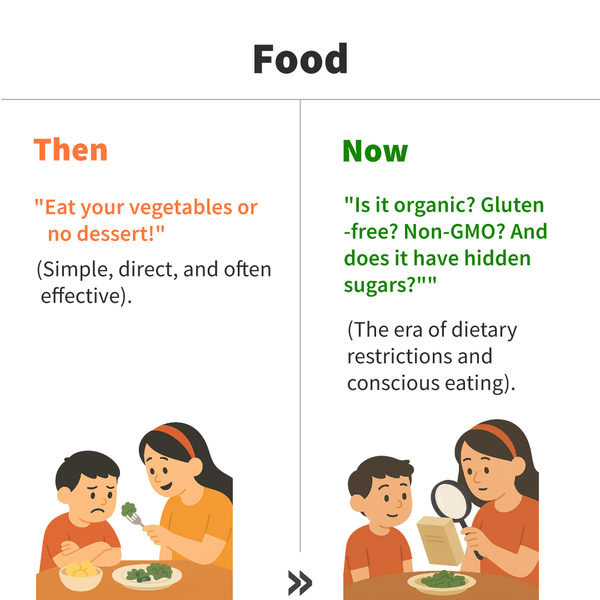
The Evolving Family Ecosystem: Shifting Roles and Rhythms
Beyond discipline, the very structure and daily pulse of family life have been reconfigured. The traditional, clearly demarcated roles of mothers and fathers have blurred into a more collaborative partnership, while the central rituals that once anchored family connection have adapted to the pressures of modern life.
The Transformation of Fatherhood
The role of the father has undergone one of the most significant evolutions in the family ecosystem. Historically, fathers were primarily seen as the economic breadwinners and the distant, stoic purveyors of moral and religious education. Daily caregiving, nurturing, and emotional support were domains largely left to mothers.
Today, this model has been almost entirely upended. Driven by widespread economic changes, such as the increased participation of women in the workforce, and evolving social norms around gender, the modern father is an engaged and nurturing co-parent. Today's dads are active participants in every facet of child-rearing, from changing diapers and packing lunches to attending parent-teacher conferences and providing emotional support.
A growing body of research confirms the profound importance of this shift. Studies now show that the affection and involvement of a father are just as critical as a mother's for a child's healthy development. Children with engaged fathers tend to have higher self-esteem, achieve greater academic success, demonstrate more empathy, and are less likely to struggle with behavioral problems. Furthermore, fathers often bring a unique parenting style to the family dynamic. They tend to engage in "rougher" and more "dangerous" play, encouraging risk-taking in a way that helps children develop crucial skills in problem-solving, independence, and emotional resilience.
This evolution is not merely a parallel trend to the shift in disciplinary styles; it is a structural prerequisite. The high-effort, high-warmth demands of modern authoritative parenting would be largely unsustainable under the old model. An approach that requires immense patience, two-way communication, and constant emotional labor is nearly impossible for one parent to carry alone. The success of today's "best practice" parenting is built upon the foundation of two fully engaged parents sharing the load. Without the evolved, hands-on father, the authoritative ideal would likely collapse under its own weight, leading to parental burnout and inconsistency.
The Shifting Center of Family Connection: From Dinnertime to Bedtime
For generations, the power of family meals was the unassailable anchor of family life—a daily ritual for connection, conversation, and the transmission of family culture. However, the pressures of modern life have chipped away at this institution. With clashing work schedules, a gauntlet of after-school activities, diverse dietary needs, and the sheer mental load of meal planning, the traditional family meal has become a significant challenge. While most parents still value the idea, studies show that only about 30% of families manage to eat together regularly, and the lament for the "lost family meal" has become a persistent cultural anxiety.
As the family dinner has become less reliable, another ritual has risen to take its place as the primary anchor for connection and stability: the bedtime routine. Unlike dinner, which is vulnerable to the chaos of evening schedules, bedtime is a non-negotiable, end-of-day event. It provides a protected, quiet window for focused parent-child interaction, free from the distractions of cooking and cleaning.
The psychological benefits once attributed almost exclusively to the family dinner are now more reliably delivered by a consistent bedtime routine. Research links a structured bedtime routine to a wealth of positive outcomes, including better sleep, improved emotional and behavioral regulation, enhanced language development, stronger parent-child attachment, and overall family functioning. The power of the routine lies less in the specific activities (such as a bath or reading a story) and more in the consistent, calming, and predictable sequence, which provides a profound sense of security for a child at the end of a long day. This pragmatic adaptation shows how modern families are finding new ways to foster connection, replacing a lost ritual with one that is more achievable and just as powerful in the context of contemporary life.
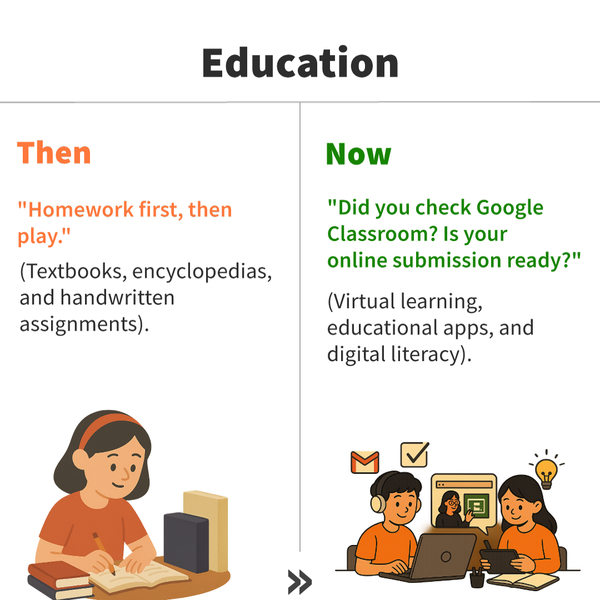
The Evolving Family Ecosystem: Shifting Roles and Rhythms
The content of a child's day—their "work"—has been fundamentally altered. The world of household responsibilities and self-directed, imaginative play that defined past generations has been largely replaced by a new reality of fewer chores, more structured activities, and the pervasive influence of digital learning environments.
The Disappearing Act of Household Chores
Historically, chores were a non-negotiable part of childhood. Children were expected to contribute to the functioning of the household as soon as they were physically able, not for an allowance, but because it was a fundamental part of family life. Today, this practice is in sharp decline. A survey by Braun Research found that while 82% of today's adults reported doing chores as children, only 28% require their own kids to do the same. This dramatic drop has raised concerns among psychologists about a potential rise in entitlement and a failure to instill essential life skills. Modern parents, pressed for time, often find it more efficient to complete tasks themselves rather than invest the effort required to teach, enforce, and supervise their children's contributions.
This trend overlooks the hidden curriculum embedded in household responsibilities. Chores are a powerful developmental tool. Research demonstrates that children who regularly participate in chores, starting as young as age three or four, develop higher self-esteem, a greater sense of responsibility, and are better equipped to manage frustration and delay gratification. The benefits are cognitive as well as emotional. Completing chores has been shown to strengthen executive functions—the critical set of mental skills that includes planning, organization, focus, and time management. In fact, one landmark longitudinal study found that having done chores as a child was the single best predictor of professional success in one's mid-20s. Chores also build empathy by giving children a tangible understanding of the effort required to maintain a shared living space.
The Evolution of Play: From Free-Range to Finely-Tuned
The nature of play has also undergone a profound evolution. For previous generations, the default mode of play was unstructured and child-led. Often called "free play," this is the spontaneous, imaginative activity that occurs without adult direction, predetermined rules, or a specific learning objective. Research confirms that this type of play is not frivolous but essential for holistic development. It is the primary engine for fostering creativity, imagination, and critical problem-solving skills. Neurologically, it strengthens the connections in the prefrontal cortex, the brain's command center responsible for planning and emotional regulation. Socially, it's where children learn to negotiate, cooperate, share, and resolve conflicts on their own terms. Exploring the benefits of
outdoor play for child development highlights its importance.
In contrast, modern childhood is increasingly defined by a decline in free play, crowded out by packed schedules, increased academic pressures, parental safety concerns, and the omnipresence of screens. Play has become more structured: adult-led activities like organized sports, music lessons, or enrichment classes that have specific goals and rules. While structured play is certainly valuable for teaching children to follow directions and work as part of a team, the lack of a healthy balance can stifle the development of intrinsic motivation, creativity, and resilience that emerges from self-directed exploration.
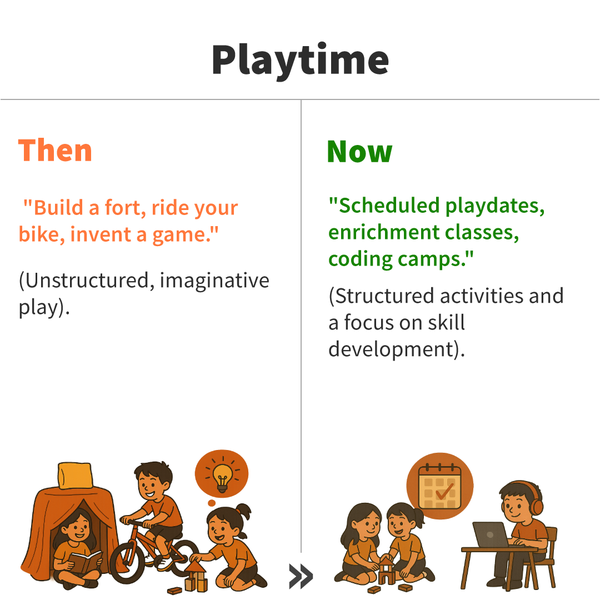
The New Classroom: Navigating the World of Digital Learning
The introduction of technology has created a new, digital classroom that extends far beyond school walls. Educational apps and online platforms offer the promise of unprecedented access to learning, with the potential to make education more engaging, interactive, and personalized. These tools can allow children to learn at their own pace and can be particularly effective for those with learning differences.
However, this digital frontier is fraught with challenges. The very devices meant to educate are also powerful sources of distraction, from games to social media. Excessive screen time is linked to overstimulation, which can manifest as mood swings, stress, and disrupted sleep patterns. A more fundamental concern is that a heavy reliance on apps can reduce vital face-to-face social interaction and may de-emphasize the development of traditional, non-digital problem-solving and deep comprehension skills. For parents, the era of remote learning has added another layer of complexity, forcing them to become IT support, academic tutors, and focus-enforcers, all while juggling their own professional and personal responsibilities.
A deep contradiction lies at the heart of these shifts in a child's daily work. Modern parenting has systematically removed the seemingly "unproductive" but developmentally vital activities of chores and unstructured play. In their place, it has substituted the "productive" and measurable work of hyper-scheduled activities and screen-based learning. This creates a productivity paradox. In an anxious effort to maximize a child's future potential, parents may be inadvertently undermining the development of the very foundational life skills—responsibility, resilience, creativity, executive function—that are the true predictors of long-term success and well-being.
This trend is part of a broader outsourcing of childhood experience. The lessons of responsibility once learned by washing dishes are now taught in character-building programs. The imaginative worlds once built in the backyard are now explored in paid-for indoor playgrounds. The learning that happened through books and direct experience is now supplemented by a vast commercial market of educational apps. This outsourcing not only places a new financial and logistical burden on parents but also recasts their role from that of direct facilitator to one of manager, scheduler, and chauffeur, contributing to the pervasive modern feeling of being overwhelmed.
The Parent in the Digital Crucible: Information, Comparison, and Guilt
The most defining feature of modern parenting is its immersion in a digital world that has fundamentally altered the internal, psychological experience of raising a child. Technology has created a crucible of information overload, relentless social comparison, and public performance, forging a new and powerful cycle of anxiety and guilt. For today's families, tech-savvy parenting is no longer an option, but a necessity.
The Double-Edged Sword of Information: The "Dr. Google" Effect
The internet promises the empowerment of the informed parent. With a few clicks, parents can access a global community for support, exchange advice on everything from sleep to discipline, and find solidarity in shared challenges. Yet this promise is a double-edged sword. The sheer volume of information, much of it contradictory and unvetted, quickly leads to information overload. Instead of clarity, parents find confusion; instead of confidence, they find anxiety.
This creates a confidence paradox. Research reveals that parents with lower self-confidence are more likely to seek out parenting information online. However, this searching does not lead to increased confidence. On the contrary, the resulting information overload is shown to decrease a parent's sense of self-efficacy. This establishes a debilitating negative feedback loop: feeling uncertain leads to searching, which leads to feeling overwhelmed and confused, which in turn deepens the initial uncertainty. The quest for answers can leave a parent feeling less effective than when they started.
The Comparison Trap: Parenting in the Age of the Curated Feed
Social media platforms have been described as the most efficient "conformity engines" ever invented, and for parents, they operate as powerful drivers of social comparison. Parents are inundated with a constant stream of "highlight reels"—curated, picture-perfect moments from other families that create unrealistic expectations and a pervasive feeling of inadequacy. A survey by Priory, a mental health provider, found that half of parents believe social media platforms like Instagram and Facebook fuel anxiety and depression by presenting unattainable standards of family life.
This pressure to "keep up" becomes intensely focused around visible milestones, particularly children's birthday parties. What began in the 19th century as a simple German tradition (kinderfeste) has morphed into a massive commercial industry. Parents report feeling immense pressure to host elaborate, "Instagrammable" events, complete with professional entertainment, custom decorations, and themed cakes. The party ceases to be a simple celebration for the child and becomes a public performance of "good parenting," judged against the impossibly high standards set by the curated online world.
The "Sharenting" Dilemma: When Sharing Becomes Oversharing
The impulse to share a child's life online, a practice known as "sharenting," is often born from positive intentions: to connect with distant relatives, build a supportive community, or document precious memories. However, this practice carries significant and often unforeseen risks for the child, making an understanding of
digital safety crucial.
The most fundamental issue is that of privacy and consent. Infants and young children are incapable of consenting to have their images, stories, and personal data broadcast online, creating a digital footprint that they may later resent or find embarrassing. This can strain the parent-child relationship as the child grows older and desires control over their own identity. Beyond privacy, there are serious safety concerns. Details shared in posts—such as a child's full name, date of birth, school, or location—can be harvested by malicious actors for identity theft or exploitation. Even seemingly innocent photos can be misused, saved, and altered, a phenomenon known as "digital kidnapping". Psychologically, having one's life publicly documented can create pressure on a child to perform for their parents' online audience and can damage self-esteem through exposure to judgment or bullying.
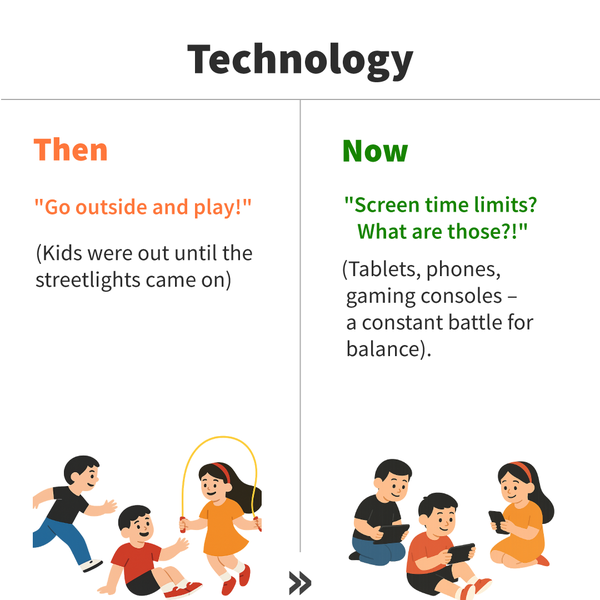
The Culmination: The Modern Epidemic of Parental Guilt
All of these digital pressures converge to fuel what has become a modern epidemic: parental guilt. Defined as the persistent feeling of falling short and being torn between competing demands, this emotion is so common that the U.S. Surgeon General identified it as the single most expressed emotion in parent interviews.
The modern environment creates a perfect storm of triggers for this guilt. Information overload breeds constant self-doubt ("Am I doing this right?"). Social comparison fosters feelings of inadequacy ("Why doesn't my family look like that?"). The demands of work create an unwinnable conflict ("I feel guilty when I'm at work, and guilty for not working when I'm with my kids"). This is not a benign feeling; chronic guilt is linked to higher rates of parental anxiety, depression, and stress, and it can lead to inconsistent parenting as parents try to overcompensate for their perceived failings.
These dynamics have created a kind of digital panopticon for parenthood. In this system, parents are simultaneously the observers, scrolling through the idealized lives of others, and the observed, curating their own family's "highlight reel" for a perceived audience. This dual role locks them into a state of constant, low-grade performance anxiety, where every parenting choice is subject to potential judgment. This fear of judgment drives the very "sharenting" and performance that, in turn, fuels the anxiety and inadequacy in other parents, creating a self-perpetuating cycle.
This pervasive sense of guilt has not gone unnoticed by the marketplace. Parental anxiety has become a massive commercial opportunity. An entire ecosystem of businesses—from party planners and app developers to "momfluencers" and parenting coaches—thrives by offering products and services that promise to solve the very anxieties the digital environment creates. The same platforms that fuel the guilt are used to market the "solutions," creating a powerful commercial incentive to keep parents in a state of perpetual self-doubt, always searching for the next purchase that will make them a "better" parent.
Conclusion: Parenting with Intention in a Noisy World
The journey from "then" to "now" reveals a complete reimagining of the parenting role. A singular, culturally enforced model of authority has been replaced by a dizzying array of expert-backed choices. Clearly defined family roles have dissolved into fluid, collaborative partnerships. A childhood once defined by household contribution and free exploration is now characterized by structured schedules and digital immersion. And a practice that was once private and intuitive has become a public, anxiety-fueled performance.
The fundamental challenge for the modern parent is not a lack of information, but a deluge of it; not a deficit of caring, but an intensity of it that can become a source of profound stress. The path forward is not to find the one "perfect" method that will solve all problems, but to develop the skill of filtering the noise. It requires a conscious shift from a state of reactive anxiety to one of proactive intention, guided by a family's own unique values.
Navigating this complex landscape successfully involves several key strategies. First is trusting parental instinct—recognizing that while data is useful, the parent is the ultimate expert on their own child. Second is setting firm boundaries with technology, which includes curating one's digital environment, limiting sources of information to a trusted few, and modeling mindful screen use. Finally, and perhaps most importantly, is the practice of self-compassion—the grace to accept that imperfection is an inherent part of the parenting journey and that mistakes are not failures, but opportunities for repair and growth.
Ultimately, the most valuable gift a modern parent can give their child is not a flawlessly executed, evidence-based, and perfectly curated childhood. It is the presence of an intentional, grounded, and self-compassionate parent who is confident enough to tune out the overwhelming noise and focus on the real, living relationship right in front of them, using simple parenting hacks to build strong bonds.
Give your kids the joy of adventure with premium ride-on cars! The SRECAP Stylish Ride-On Car offers durability, style, and strong motors for a thrilling experience. For tech-savvy fun, the Little Rides Battery-Operated Car includes Bluetooth music and a sleek design—perfect for modern kids.
Sources used in this blog
Opposing Viewpoints: Corporal Punishment in the Home and Its Affects on Children - LAW eCommons
How Child Discipline Has Changed: A Brief History - Fatherly
Parenting Styles' Influence on Child Behavior: Understanding the Impact of Parenting Approaches - Empowered Early Learning Academy
Types of Parenting Styles and Their Impact on Children - Mental Health Center Kids
Childhood in the 18th Century - Julia Brannan
Authoritarian to authoritative, permissive, and uninvolved: Which is the ideal parenting style
Parenting Styles and Their Influence on Child Development: A Critical Review of Contemporary Research - Premier Science
Authoritative vs. Authoritarian Parenting: What's the Difference? - Mental Health Center Kids
Gentle vs. Authoritative Parenting - WholeMind Psychology
A History of Corporal Punishment
Authoritative Versus Authoritarian Parenting Style - Psychology Today
Which Parenting Style Is Best? - Nurtured First
Why Parenting Styles Matter When Raising Children - Verywell Mind
Examining Authoritarian Vs. Authoritative Parenting - BetterHelp

Comments
No comments yet. Be the first to leave a comment!